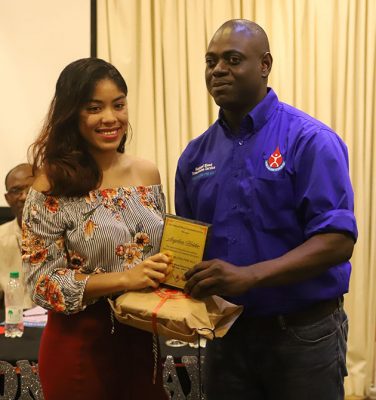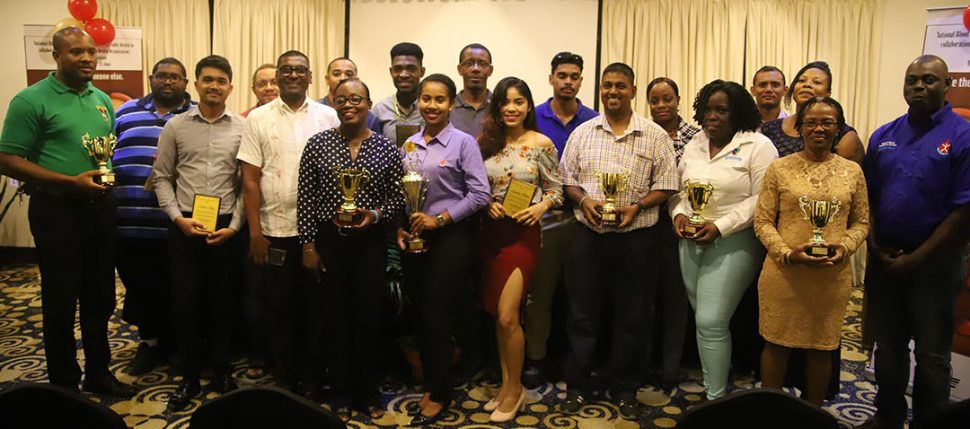The National Blood Transfusion Service (NBTS) on Friday hosted its annual Blood Donor Award ceremony, an event held to reward and thank Guyana’s most committed blood donors and organisations which have helped in that regard.
In celebration of World Blood Donor Day, a number of committed blood donors were presented with commemorative awards at a ceremony which was held to recognise the invaluable contribution they have made to Guyanese healthcare. Additionally, organisations and companies that have collaborated with the NBTS were also presented with trophies.
The ceremony was held at the Herdmanston Lodge.

At the ceremony, the representative of the Ministry of Public Health, Dr. Shamdeo Persaud, expressed gratitude to blood donors, the organisers of donors and the companies that have contributed to the NBTS. “Thank you very much for sharing life,” he stated.
Persaud went on to say that the recognition of persons who have donated blood began in the mid-1990’s. He revealed that the blood donors that were honoured on Friday have stood out in terms of donating blood over the last couple of years, and applauded their commitment.
He stated that although blood goes to victims of accident or trauma, an even larger proportion of blood goes to save the lives of pregnant women. Persaud noted that 5% of the Guyanese population is needed to donate blood in order to garner enough blood to save lives. He further noted that as of recent, persons in need of blood are rare.
With regards to the safety of blood recipients, Persaud said that NBTS tests the blood to ensure that persons aren’t given a disease or a condition that they don’t have. He said that the NBTS can guarantee 100% safety to the recipients of blood.
Furthermore, Persaud stated that over the past year, Dr. Pedro Lewis and his team from the NBTS have expanded blood collections to hinterland areas such as Lethem and Bartica and are planning to expand to areas such as Mahdia and Port Kaituma, once the necessary infrastructure is in place at those areas.
He revealed that NBTS is considering ways they can enhance blood. He said that they are planning to provide special platelets that will be devoid of white blood cells, which will reduce any reactions that may occur in the recipient’s body. He noted, however, that it would be costly to do so and further revealed that they sometimes have to borrow basic materials that are required for blood donations. Expenses have lessened, however, as big companies and organisations have begun collaborating with the MoPH and NBTS in that regard.
Persaud encouraged persons present to participate actively as voluntary donors. He said that they have distribution sites at most of the populated parts of the country, including private hospitals. He stressed on the fact that there are pregnant women all over the country that may be in need of blood.
Twenty-three-year-old Francine Leitch then applauded donors for their courage and generosity which has led to saving countless lives, including hers. Leitch revealed that she was a recipient of blood transfusions and was diagnosed with cancer in 2015. In order to undergo her first cycle of chemotherapy, she needed 12 units of blood which she received from the NBTS. After that, she needed two more units, which ultimately saved her life. She revealed that although she is not able to donate blood, she always tries to encourage persons to do so. In addition, she said that she always takes on the task of informing persons that there is no harm in donating blood regularly.
One of the awardees, Angelica Holder, related that the reason why she donates blood and continues to donate blood, is because her father was bitten by a poisonous snake when she was a child. Due to that, she said, there was a very high risk of her father bleeding to death. Further, he required a lot of blood and as a result, her family was forced to move from their Linden home to Georgetown to access better healthcare for him. She confided that it was traumatic for her knowing that her father could have died at any moment.
However, her father was able to get the blood he needed and eventually got better. Holder then related that due to her family’s experience when her father was desperately in need of blood, she, her brother, along with her father and mother, are regular donors of blood. As a healthcare worker, she revealed that she also encourages persons to donate blood and tries to take a new person with her every time she goes to donate.
“To give a part of myself to someone, who may need it, is pretty simple,” Holder concluded.










